
International Journal of Artificial Intelligence in Education
Scope & Guideline
Connecting Scholars to the Future of AI in Education
Introduction
Aims and Scopes
- Integrating AI Technologies in Education:
The journal explores how various artificial intelligence technologies, such as machine learning and natural language processing, can be integrated into educational practices to enhance learning outcomes. - Learning Analytics and Student Modeling:
A significant focus is placed on learning analytics, emphasizing methods for tracking, analyzing, and interpreting student data to improve educational experiences and outcomes. - Personalized Learning Environments:
The journal investigates the development of adaptive learning systems that tailor educational experiences to individual student needs, promoting personalized learning pathways. - Ethics and Social Implications of AI in Education:
Research in this area examines the ethical considerations and social implications of implementing AI in educational contexts, ensuring responsible use of technology. - Teacher and Student Perspectives:
The journal emphasizes understanding the perspectives of both educators and learners regarding the integration of AI tools in the classroom, fostering a collaborative approach to AI in education. - Innovative Assessment Methods:
IJAIED publishes studies on novel assessment techniques facilitated by AI, including automated scoring and feedback systems that enhance the evaluation process.
Trending and Emerging
- Generative AI and Content Creation:
There is a growing trend in exploring the use of generative AI tools, such as ChatGPT, for creating educational content, assisting in writing tasks, and enhancing learning materials. - AI in Special Education:
The journal has increasingly featured research focused on leveraging AI to support special education needs, indicating a commitment to inclusivity and accessibility in educational technology. - AI Ethics and Responsible AI Use:
Emerging discussions around the ethical implications of AI in education are becoming more prominent, emphasizing the need for responsible implementation of AI technologies. - AI-Enhanced Collaborative Learning:
Recent studies highlight the integration of AI in collaborative learning environments, focusing on how AI can facilitate group interactions and improve learning outcomes in social contexts. - Adaptive Learning Technologies:
Research on adaptive learning systems, which utilize AI to customize educational experiences based on real-time data about learner performance, is increasingly prevalent. - AI Literacy and Educator Training:
An emerging theme is the focus on developing AI literacy among educators, ensuring that they are equipped to integrate AI tools effectively in their teaching practices.
Declining or Waning
- Traditional Assessment Methods:
There has been a noticeable decrease in research focusing on conventional assessment methods as AI-driven assessment techniques gain traction and popularity among educators. - General Educational Technology Trends:
The focus on generic educational technology trends appears to be waning as the journal increasingly concentrates on specific applications of AI and machine learning in education. - Non-AI-Centric Pedagogical Approaches:
Research that does not incorporate AI or machine learning elements has become less frequent, suggesting a shift towards more technology-enhanced pedagogical strategies. - Education Policy Discussions:
While still relevant, discussions centered around broad education policy issues related to technology integration in education have become less prevalent compared to specific AI applications.
Similar Journals

Journal of Computers in Education
Exploring the Future of Learning with Computers.The Journal of Computers in Education is a distinguished academic journal published by SPRINGER HEIDELBERG, dedicated to advancing the intersection of technology and pedagogy. With an ISSN of 2197-9987, this journal has established itself as a pivotal resource for researchers and educators alike since its inception in 2019, maintaining a strong focus on innovative applications of computer science within educational contexts. Ranked in the Q1 category in both Computer Science Applications and Education, the journal demonstrates a high impact in its field, holding a remarkable position within the top 1.5% of journals in social sciences (rank #20/1543) and top 5.5% in computer science applications (rank #45/817). The journal's scope encompasses a wide range of topics including but not limited to educational technologies, e-learning methodologies, and the effective integration of computers in teaching, making it an essential source for professionals and students who are keen to explore cutting-edge research and trends. Although access options vary, the journal's commitment to disseminating quality research continues to enrich the academic landscape in Germany and beyond, nurturing the synergies between education and technology.
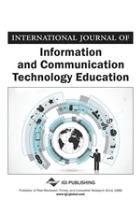
International Journal of Information and Communication Technology Education
Empowering educators through impactful research and insights.International Journal of Information and Communication Technology Education (ISSN: 1550-1876, E-ISSN: 1550-1337), published by IGI Global, stands at the forefront of educational research, focusing on innovative uses of information and communication technologies in the educational landscape. With an impressive impact factor and consistently high rankings—the journal is positioned in the Q3 category for both Computer Science Applications and Education in the 2023 evaluations—this journal serves as a vital platform for scholarly contributions that aim to advance teaching methodologies and enhance learning experiences. Spanning from 2005 to 2024, it explores diverse topics in e-learning and technology-enhanced education, making it an essential resource for researchers, professionals, and students passionate about the intersection of technology and pedagogy. Though specifically not an open-access journal, the invaluable insights it offers foster knowledge dissemination and innovation in the field. Located in the United States, at 701 E Chocolate Ave, Hershey, PA, the journal remains committed to fostering a collaborative and transformative approach to learning in today's digitally-driven society.
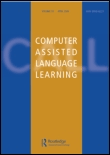
Computer Assisted Language Learning
Connecting Technology and Linguistics for Enhanced LearningComputer Assisted Language Learning is a prestigious journal dedicated to the interdisciplinary field of language education technology, published by Routledge Journals, Taylor & Francis Ltd. With its ISSN 0958-8221 and E-ISSN 1744-3210, the journal has become a cornerstone for researchers and practitioners interested in the innovative integration of computer technology in language learning processes. As of 2023, it holds an impressive impact factor, ranking Q1 in both Computer Science Applications and Linguistics and Language categories, indicating its significance within these scholarly domains. The journal covers a wide array of subjects, including language acquisition, educational technology, and instructional design, facilitating an understanding of how digital tools can enhance language learning experiences. Its rigorous editorial standards ensure that published articles undergo thorough peer review, making it a highly respected platform for disseminating cutting-edge research. With an extensive publication history dating back to 1990 and an ongoing commitment to exploring the dynamics of language learning in digital contexts, this journal is essential for academics, educators, and students alike who are looking to stay at the forefront of research in computer-assisted language education.

Medical Science Educator
Innovating education to empower future healthcare leaders.Medical Science Educator, published by SpringerNature, is an esteemed journal committed to advancing the intersection of educational methodologies and medical science. With a significant impact in its field, this journal holds a Q2 ranking in both Education and Medicine (miscellaneous) categories as of 2023, reflecting its dedication to high-quality research and scholarly dialogue. Operating in a digital format, the journal uniquely facilitates access to pivotal studies from its inception in 2011 until 2024, fostering innovation in medical education. The latest rankings highlight its credibility, placing it at the 63rd percentile in Social Sciences - Education and the 56th percentile in Medicine - Medicine (miscellaneous) within Scopus. This platform serves as an invaluable resource for educators, researchers, and practitioners aiming to enhance teaching practices and shape the future of medical education.
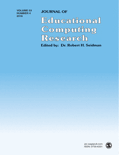
JOURNAL OF EDUCATIONAL COMPUTING RESEARCH
Pioneering research at the tech-education frontier.JOURNAL OF EDUCATIONAL COMPUTING RESEARCH, published by SAGE PUBLICATIONS INC, is a leading academic journal dedicated to advancing research in the intersection of education and computing technology. With a prestigious Q1 ranking in both Computer Science Applications and Education categories, it plays a vital role in disseminating high-quality research that shapes the future of educational practices and technological integration in learning environments. The journal's rigorous peer-review process ensures that only the most impactful studies reach its discerning audience, which includes educators, researchers, and policy-makers. As a result, the impact factor highlights its significance in the field, as it stands out in the top tier of academic journals, reflecting a strong commitment to quality scholarship. The Journal serves as a vital resource for those aiming to explore innovative applications of computing in education, fostering collaboration and knowledge exchange within the academic community. For further details, submissions, and access to insightful articles, visit their website or reach out to their office at 2455 TELLER RD, THOUSAND OAKS, CA 91320.

JMIR Medical Informatics
Transforming Healthcare with Cutting-Edge ResearchJMIR Medical Informatics is a leading open access journal dedicated to the field of medical informatics, published by JMIR Publications, Inc. since 2013 in Canada. With an impressive impact factor and a distinguished Q2 ranking in both Health Informatics and Health Information Management categories, this journal plays a pivotal role in disseminating cutting-edge research and innovative practices. Covering a wide scope that includes clinical informatics, health information systems, and data analytics, JMIR Medical Informatics provides valuable insights for researchers, practitioners, and policymakers alike. The journal is accessible to a global audience, ensuring that pioneering studies and methodologies reach those who can apply them to enhance health outcomes. With its commitment to advancing the body of knowledge in medical informatics, this journal stands as a vital resource for anyone involved in or studying the intersection of healthcare and technology.
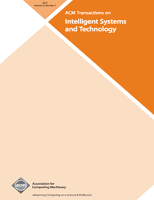
ACM Transactions on Intelligent Systems and Technology
Unleashing the Potential of AI and Computational ScienceACM Transactions on Intelligent Systems and Technology, published by the Association for Computing Machinery (ACM), is a leading peer-reviewed journal dedicated to the rapid dissemination of innovative research in the fields of Artificial Intelligence and Theoretical Computer Science. With an impressive Impact Factor and a strong H-Index, it boasts a premier standing in the academic community, being ranked Q1 in both AI and Theoretical Computer Science categories as of 2023. This journal serves as a critical platform for researchers, professionals, and students aiming to contribute to and stay informed about the latest developments in intelligent systems and technology. While there are currently no open-access options, readers can explore invaluable insights into current trends and methodologies from 2010 to 2024, making it an essential resource for anyone passionate about advancing their knowledge in these rapidly evolving domains. The journal continues to foster collaboration and innovation, reflecting the forefront of research where technology intersects with intelligent systems.
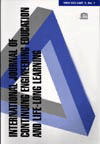
International Journal of Continuing Engineering Education and Life-Long Learning
Transforming Education through Continuous Learning.Welcome to the International Journal of Continuing Engineering Education and Life-Long Learning, a peer-reviewed scholarly journal committed to advancing the discourse in the fields of education, e-learning, and engineering. Published by InderScience Enterprises Ltd in the United Kingdom, this journal serves as a vital resource for researchers, educators, and professionals seeking to explore innovative approaches to lifelong learning and continuing education within engineering disciplines. With an ISSN of 1560-4624 and an E-ISSN of 1741-5055, the journal reflects an ongoing commitment to academic rigor, featuring contributions that span from 1986 to the present. Although classified in the fourth quartile of Scopus rankings in both education and engineering categories, the journal embraces the evolving landscape of technological integration in education, offering a platform for the dissemination of cutting-edge research and practical applications. We invite you to delve into the insightful articles that strive to equip engineering professionals with the knowledge necessary to maintain relevance in an ever-changing world.

Smart Learning Environments
Shaping the next generation of intelligent learning environments.Smart Learning Environments, published by Springer Heidelberg, is a leading open-access journal dedicated to advancing the field of educational technology and intelligent learning systems. Since its inception in 2014, this journal has established itself as a vital resource for researchers and practitioners, showcasing innovative interdisciplinary approaches that enhance learning experiences using smart technologies. With a notable impact factor and recognition in the top quartiles (Q1) of both Computer Science Applications and Education, it ranks within the top 2% of journals in the Social Sciences – Education category and the top 7% in Computer Science, according to Scopus. The journal's scope encompasses empirical studies, theoretical papers, and reviews, making it an essential platform for disseminating cutting-edge research. Researchers, educators, and technology professionals are encouraged to engage with this premier outlet, which not only facilitates access to high-quality research but also promotes collaboration across academic and professional spheres.

Acta Informatica Pragensia
Fostering Dialogue: Elevating Research in Library and Information Sciences.Acta Informatica Pragensia is a prominent open access journal published by UNIV ECONOMICS, PRAGUE, which has been dedicated to advancing the fields of Computer Science Applications, Information Systems, Library and Information Sciences, and Management Information Systems since its inception in 2012. Situated in the beautiful Czech Republic, this journal aims to foster academic dialogue and disseminate high-quality research across these interdisciplinary domains. With an H-index indicating its growing impact, Acta Informatica Pragensia offers authors the opportunity to publish their findings in a Q4 ranked journal within significant categories according to the 2023 metrics, including a notable Q3 in Library and Information Sciences. Its placement in the Scopus ranks also showcases its relevance in the field, including a solid position in the 58th percentile for Library and Information Sciences. The journal's open access model ensures that research is widely available, empowering students, researchers, and professionals to engage with the latest innovations and trends. Submissions from diverse backgrounds are welcomed, making it an essential resource for those seeking to contribute to the evolution of information technology and systems.